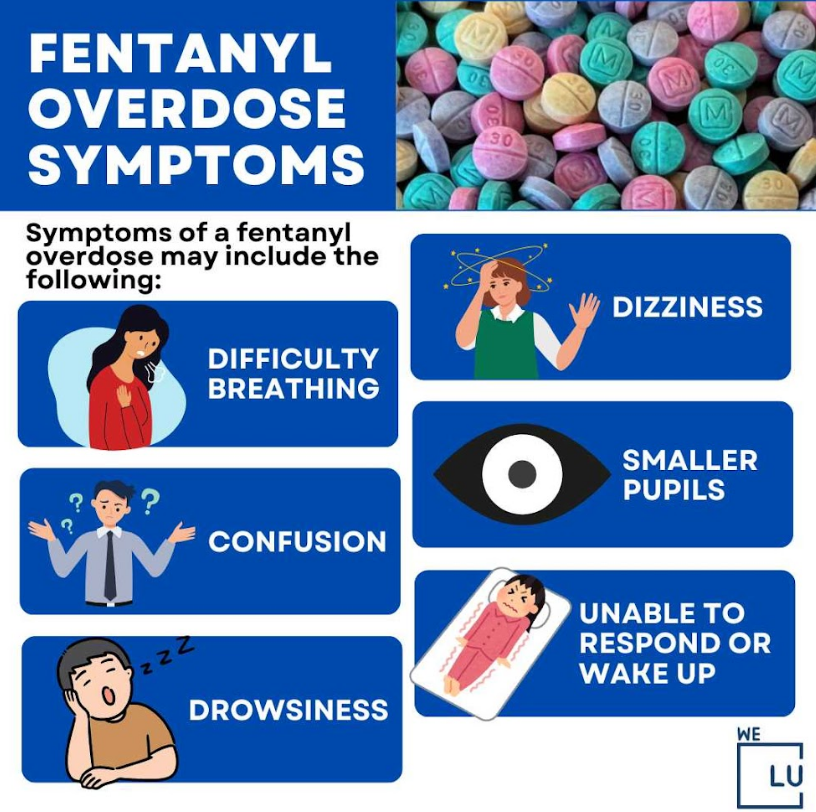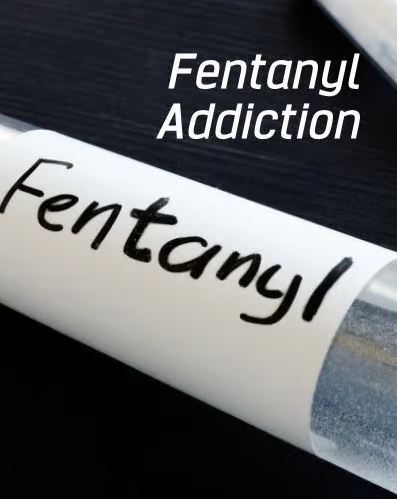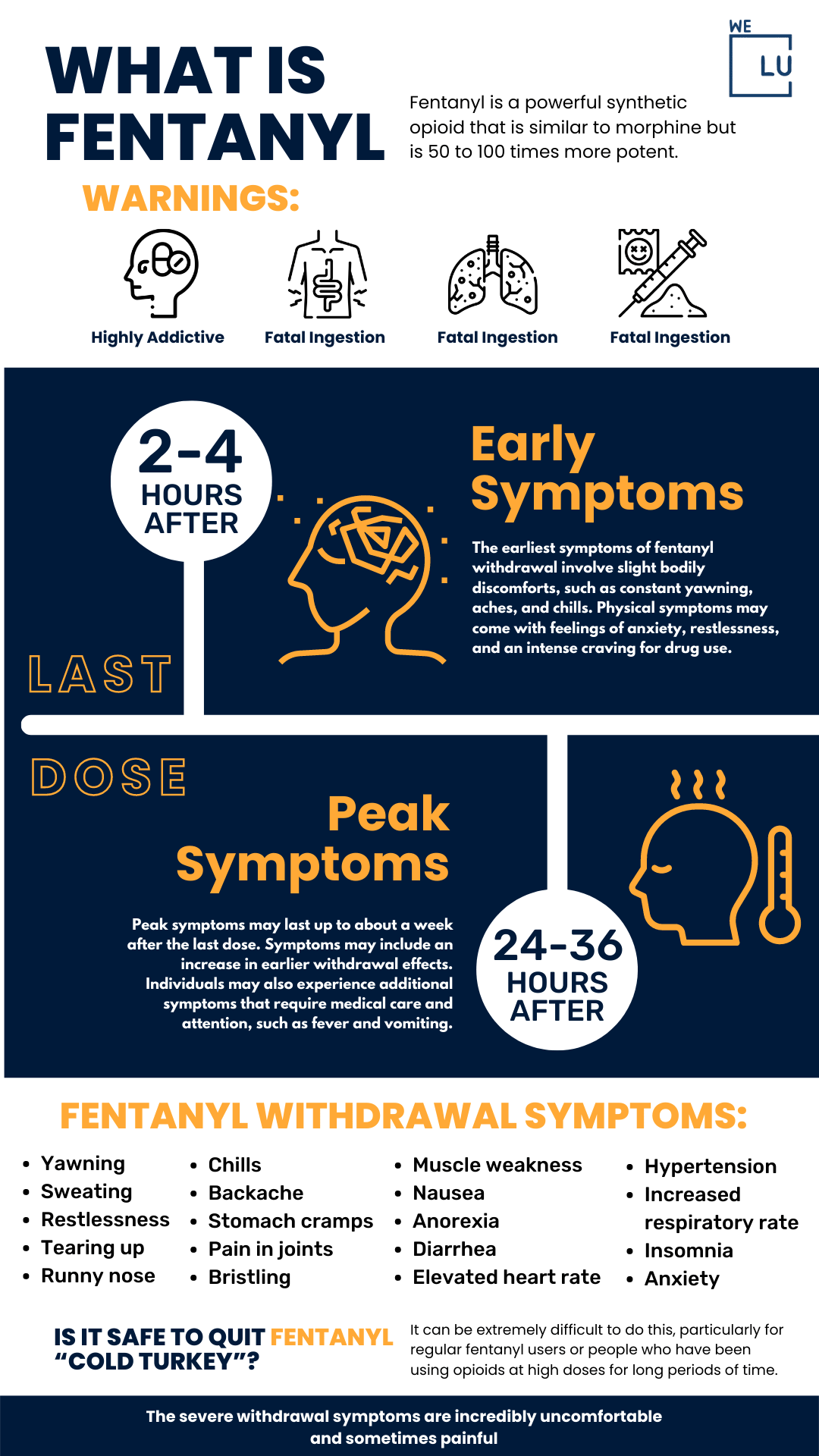Fentanyl Addict
Fentanyl is a powerful pain medication. It is an opioid, like morphine, codeine, oxycodone (oxys), and methadone. Fentanyl is much more potent than most other opioids—up to 100 times stronger than morphine—and is dangerous if abused. What does fentanyl taste like? Fentanyl has no taste of its own. However, when taken in excessive doses, it becomes bitter to taste. Fentanyl is addictive, and the long-term effects of fentanyl abuse can cause damage to the entire body. Most recent cases of fentanyl-related overdose, harm, and death in the U.S. are linked to illegally made and street fentanyl. Fentanyl rehab and detox centers can help those suffering from fentanyl addiction overcome their withdrawal from fentanyl.
Fentanyl’s use and availability has increased in the medical community as well as among recreational drug users and fentanyl addicts. In most states across the US, the use of opioids, including fentanyl, is rising fast. From March 2018 to February 2019, 47% of drug overdoses involved fentanyl. 2 mg of fentanyl is a lethal dose, but doses as small as 0.25 mg place the user at a high risk of overdose. In addition to its high potency, the “hot spots” it leaves in cutting other drugs make fentanyl among the most lethal substances available on the recreational drug market.
With so many fentanyl addict, and overdose deaths occurring more frequently than ever, it’s important to know what the signs and symptoms of fentanyl addiction look like. Fentanyl is abused because it produces a more potent high than other opioids. Because fentanyl is sold illegally in powder, liquid, spray, or pill., some substance abusers use fentanyl without knowing it because it is mixed into other drugs. This can include heroin, cocaine, methamphetamine, and MDMA. Very little of the drug is needed to produce the desired effects. People using other drugs may not realize fentanyl is laced into it.
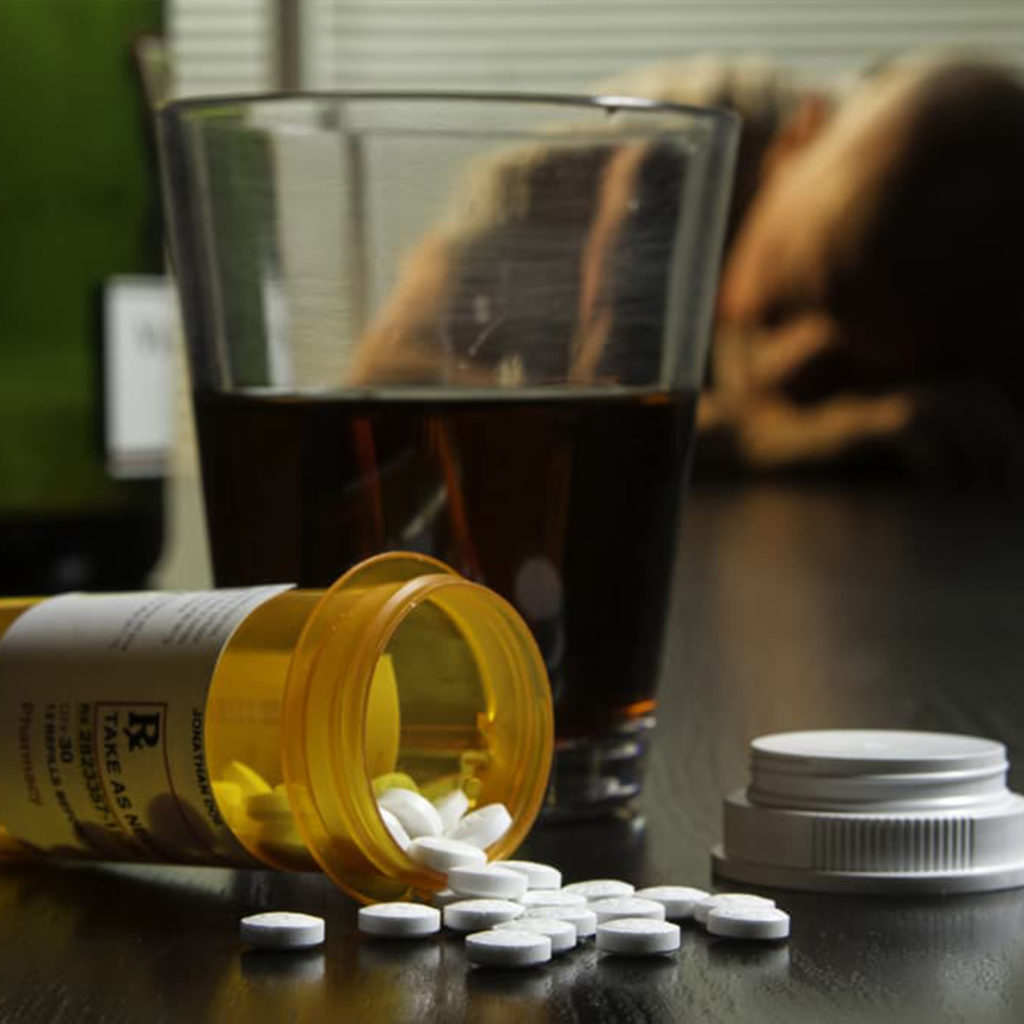
Get Help. Get Better. Get Your Life Back.
Searching for Accredited Drug and Alcohol Rehab Centers Near You?
Even if you have failed previously and relapsed, or are in the middle of a difficult crisis, we stand ready to support you. Our trusted behavioral health specialists will not give up on you. When you feel ready or just want someone to speak to about therapy alternatives to change your life call us. Even if we cannot assist you, we will lead you to wherever you can get support. There is no obligation. Call our hotline today.
(844) 597-1011Fentanyl Addiction Signs
Fentanyl addiction can be incredibly dangerous and even lethal. Unfortunately, it’s not always easy to identify a fentanyl addict, especially if the person is actively trying to hide their addiction. However, knowing the signs of fentanyl abuse and addiction can help determine if your loved one is abusing this drug and enable you to seek fentanyl addiction treatment options.
Signs that someone should seek professional fentanyl addiction treatment:
Psychological Changes
Fentanyl binds to opioid receptors in the central nervous system (CNS). Once the fentanyl molecules attach to the opioid receptors, they flood the brain’s reward centers with dopamine. This causes a sense of extreme euphoria and relaxation. Too much dopamine can lead to sedation, nausea, confusion, respiratory arrest, depression, and more.
One significant fentanyl addiction sign is psychological changes. Fentanyl can make it difficult for the user to concentrate or remember things. This means that a person may seem to be daydreaming or not paying attention during the conversation.
Additional psychological signs of fentanyl addiction may include:
- Confusion
- Impaired judgment
- Disorientation
- Anxiety
- Depression
- Paranoia
- Rapid mood swings
- Depression
- Hallucinations
Behavioral Changes
A warning sign of fentanyl addiction includes observable changes in behavior even if they have only been abusing fentanyl for a short time. This is due to the potency of the drug.
Some behavioral changes from fentanyl use include:
- Extreme lethargy
- Mood swings
- Withdrawing from family and friends
- Engaging in dangerous behavior
Fentanyl addicts may also stop caring for themselves and neglect personal hygiene and basic needs such as proper nutrition and exercise. The deeper someone is in their addiction to fentanyl, the more they will likely disregard health and wellness.
Physical Changes
Physical signs of fentanyl addiction typically only happen when taking more of the drug than prescribed. Drowsiness or “nodding off” is one of the most common physical signs of fentanyl abuse. A person may appear to suddenly fall asleep during a conversation or nod off at an inappropriate time.
Other physical signs of fentanyl addiction include:
- Labored or shallow breathing
- Constipation
- Upset stomach
- Convulsions
- Lightheadedness
- Loss of appetite
- Pale skin
- Ulcers or sores in the mouth
- Sunken eyes
Experiencing Withdrawal Symptoms of Fentanyl
When people use fentanyl regularly, their body becomes dependent on the drug. This means that to feel “normal” and for the body to function correctly, a person must take fentanyl. Conversely, when a fentanyl addict is not taking the drug, they may experience fentanyl withdrawal symptoms. The severity of fentanyl withdrawal symptoms varies widely.
Fentanyl withdrawal symptoms may include:
- Restlessness
- Irritability
- Flu-like symptoms
- Weakness
- Muscle aches and pains
- High blood pressure
- Elevated heart rate
- Upset stomach
Because these fentanyl withdrawal symptoms can be severe, medical detox is recommended.
Drug-Seeking Behavior
People addicted to drugs like fentanyl will often go to great lengths to obtain the drug. Common drug-seeking behaviors may include:
- “Doctor shopping” to get more than one prescription,
- Stealing prescriptions from friends or family and stealing or borrowing money to buy the drug.
- Requesting to have the dose increased
- Hoarding drugs
- Unwilling to consider other drugs or non-drug treatments
- Obtaining controlled drugs from illicit sources
- Deterioration at home or work or reduction of social activities because of adverse drug effects
Overdosing On Fentanyl
The illegally used fentanyl associated with recent overdoses is made in labs. This synthetic fentanyl is sold unlawfully as a powder, dropped onto blotter paper, put in eye droppers and nasal sprays, or made into pills that look like other prescription opioids.
Because of the potency of fentanyl, consuming more than what is prescribed can easily result in an overdose. A fentanyl overdose can be dangerous if not dealt with immediately.
The most common signs of an opioid overdose include:
- Depressed breathing
- Pinpoint pupils
- A faint pulse
- Loss of coordination
- Unconsciousness
If you believe someone is experiencing a fentanyl overdose, seek medical help as soon as possible.

Get Your Life Back
Find Hope & Recovery. Get Safe Comfortable Detox, Addiction Rehab & Dual Diagnosis High-Quality Care.
Hotline(844) 597-1011Fentanyl Addiction Symptoms
Fentanyl abuse and addiction may be similar to abuse and addiction of other opioid-related drugs. When used properly to treat pain, opioids reduce pain and the emotional response to pain. However, when they are misused, they may produce:
- Euphoria
- Drowsiness
- Relaxation
- Difficulty concentrating
- Constricted pupils
- Slowed breathing
- Nausea
- Vomiting
- Constipation
- Loss of appetite
- Sweating
- Overdose
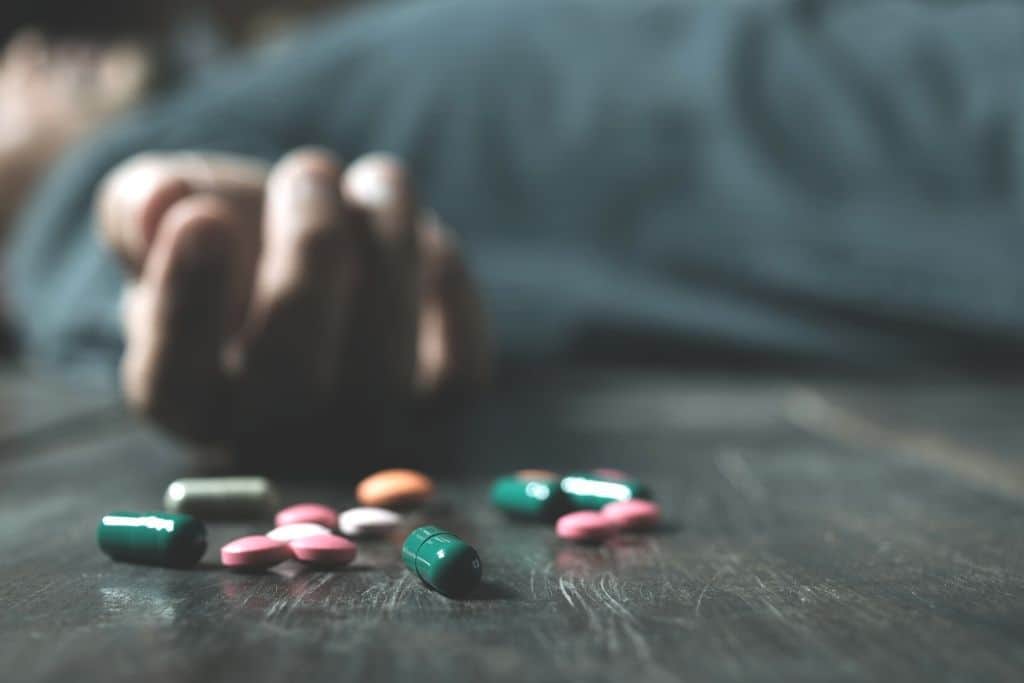
It is often impossible to tell if a powder or pill contains fentanyl. You can’t see it, smell it or taste it. Even your dealer might not know what they are selling or how strong it is. Because fentanyl is so strong, the difference between a dose that will get you high and a dose that can kill you is very small. The risk of overdose is even higher if you are using other drugs simultaneously—for example, other opioids, alcohol, or sedatives such as Xanax, Valium, or Ativan.
How Long Does it Take to Get Addicted to Fentanyl?
Fentanyl is a highly addictive synthetic opiate used to treat chronic and severe pain. This means that fentanyl is a narcotic pain reliever that carries a high risk of abuse. The key symptom of being addicted to fentanyl is tolerance. As you continue to use fentanyl, you can slowly build up a tolerance to it, which means that you no longer get the same feeling or high that you once got by taking a small amount.
Once your tolerance begins to build, you might increase the dose or frequency of taking fentanyl. You are trying to get that same high that you felt in the beginning when your body was not used to the drug. As you continue to build tolerance, you end up taking more of the drug. Your body becomes chemically dependent on the drug. This means you discover that you need to take the drug just to feel normal or leveled out.
How Does Fentanyl Works?
Fentanyl’s effects come on quicker than morphine, but they don’t last as long. The drug remains in the body for over a day, impacting different organs and systems. Once ingested, fentanyl molecules are distributed in fat and attach to human plasma proteins. The bloodstream then delivers fentanyl to the brain, which acts preferentially on the μ-opioid peptide receptors.
To a lesser extent, it’s also active with κ-opioid and delta opioid receptors. These receptors ultimately produce the medicinal effects or “high” in the user. The liver metabolizes fentanyl to be excreted by the kidneys. Fentanyl’s narcotic effects can last anywhere from 2 to 16 hours. Excretion takes 6 to 32 hours.
First-class Facilities & Amenities
World-class High-Quality Addiction & Mental Health Rehabilitation Treatment
Rehab Centers TourRenowned Addiction Centers. Serene Private Facilities. Inpatient rehab programs vary.
Addiction Helpline(844) 597-1011Proven recovery success experience, backed by a Team w/ History of:
15+
Years of Unified Experience
100s
5-Star Reviews Across Our Centers
10K
Recovery Success Stories Across Our Network
- Low Patient to Therapist Ratio
- Onsite Medical Detox Center
- Comprehensive Dual-Diagnosis Treatment
- Complimentary Family & Alumni Programs
- Coaching, Recovery & Personal Development Events
Fentanyl Addiction Treatment
First and foremost, if you think a loved one is abusing fentanyl, you should research the drug and its associated addiction to understand better what your loved one needs. Next, you must plan an intervention to provide your loved ones with options to battle the effects of fentanyl abuse in a safe and supportive environment. During this intervention, offer compassion and support instead of judgment. Lastly, show your support throughout the entire treatment process.
In addition, prolonged drug use can have severe physical and psychological effects on you, so it is essential to seek treatment as soon as possible. Inpatient drug rehab offers intensive care that can help you promptly get through the early stages of fentanyl withdrawal.
Fentanyl Detox Treatment
Fentanyl detox is the process of weaning someone off of a fentanyl dependency. It allows members of fentanyl rehab centers like We Level Up to recover safely and comfortably. While an uncomfortable withdrawal from fentanyl is unavoidable, it doesn’t have to be unbearable.
Medical detox is often considered the first stage of treatment. It will help you navigate the complicated withdrawal from fentanyl but doesn’t address patterns of thought and behavior contributing to drug use. Various treatment approaches and settings can help provide the ongoing support necessary to maintain long-term sobriety after you complete detox.
Cravings are very common during detox and can be challenging to overcome. This often leads to relapse. Constant medical care provided during inpatient treatment helps prevent relapse. Clinicians can give necessary medication and medical expertise to lessen cravings and withdrawal effects from fentanyl.
Inpatient Fentanyl Rehab
There isn’t one treatment approach or style that will suit everyone. Treatment should speak to the needs of the individual. Inpatient fentanyl rehab and addiction treatment aren’t just about drug use. the goal is to help the patient stop using fentanyl and other substances, but fentanyl rehab should also focus on the whole person’s needs.
Addiction is a complex but treatable disease that affects brain function and behavior. When someone or their family is considering different fentanyl treatment facilities, they should account for the complexity of addiction and the needs of the individual. The objective of attending an inpatient fentanyl rehab center for addiction treatment is to stop using the drug and re-learn how to live a productive life without it.
Following a full medical detox from fentanyl, most people benefit from inpatient fentanyl rehab. Inpatient drug rehab can last anywhere from 28 days to several months or more. Patients stay overnight in the rehab facility and participate in intensive treatment programs and therapy. Once someone completes rehab, their addiction treatment team will create an aftercare plan, which may include continuing therapy and participation in a 12-step program like Narcotics Anonymous.
World-class, Accredited, 5-Star Reviewed, Effective Addiction & Mental Health Programs. Complete Behavioral Health Inpatient Rehab, Detox plus Co-occuring Disorders Therapy.
CALL(844) 597-1011End the Addiction Pain. End the Emotional Rollercoaster. Get Your Life Back. Start Drug, Alcohol & Dual Diagnosis Mental Health Treatment Now. Get Free No-obligation Guidance by Substance Abuse Specialists Who Understand Addiction & Mental Health Recovery & Know How to Help.
Psychotherapy
Many rehab programs will also have early morning classes or programs. Group sessions occur during inpatient rehab, as do individual therapy sessions. Family therapy may be part of inpatient rehab when it’s feasible. Alternative forms of therapy may be introduced during inpatient fentanyl rehab, like a holistic therapy program, yoga for addiction recovery, or an addiction treatment massage therapy.
Several different modalities of psychotherapy have been used in the treatment of mental health disorders along with addiction, including:
- Cognitive Behavioral Therapy (CBT) – is an effective treatment that involves changing both the patterns of negative thoughts and the behavioral routines which are affecting the daily life of the depressed person for various forms of depression.
- Dialectical Behavioral Therapy – is a comprehensive mental health and substance abuse treatment program whose ultimate goal is to aid patients in their efforts to build a life worth living. The main goal of DBT is to help a person develop what is referred to as a “clear mind.”
- Solution-focused therapy is an approach interested in solutions that can be quickly implemented with a simple first step leading to further positive consequences.
Experience Transformative Recovery at We Level Up Treatment Centers.
See our authentic success stories. Get inspired. Get the help you deserve.
Start a New Life
Begin with a free call to an addiction & behavioral health treatment advisor. Learn more about our dual-diagnosis programs. The We Level Up Treatment Center Network delivers recovery programs that vary by each treatment facility. Call to learn more.
- Personalized Care
- Caring Accountable Staff
- World-class Amenities
- Licensed & Accredited
- Renowned w/ 100s 5-Star Reviews
We’ll Call You
Dual Diagnosis Treatment
Drug abuse and mental health disorders often co-occur. In many cases, traumatic experiences can result in a mental health disorder and substance abuse. Dual diagnosis rehabilitation treats both of these issues together. The best approach for the treatment of dual diagnosis is an integrated system. This strategy treats both the substance abuse problem and the mental disorder simultaneously. Regardless of which diagnosis (mental health or substance abuse problem) came first, long-term recovery will depend mainly on the treatment for both diseases done by the same team or provider.
Medication Assisted Treatments (MAT)
Medication-Assisted Treatments (MAT) for substance use and mental health disorders are commonly used in conjunction with one another. This includes the use of medications and other medical procedures. During your rehab, the staff from your treatment facility will help you identify what caused your addiction and teach you skills that will help you change your behavior patterns and challenge the negative thoughts that led to your addiction. Sometimes, the pressures and problems in your life lead you to rely on substances to help you forget about them momentarily.
Please, do not try to detox on your own. The detox process can be painful and difficult without medical assistance. However, getting through the detox process is crucial for continued treatment. We Level Up provide proper care with round-the-clock medical staff to assist your recovery through our opioid addiction treatment program medically. So, reclaim your life, and call us to speak with one of our treatment specialists. Our counselors know what you are going through and will answer any of your questions.
Fentanyl Rehab Near Me
Fentanyl addiction is a condition that can cause major health problems, such as an overdose. We Level Up rehab treatment & detox center can provide you, or someone you love, the tools to recover from this with professional and safe treatment. Feel free to call us to speak with one of our counselors. We can inform you about this condition and give you clarity about issues like the fentanyl withdrawal symptoms. Our specialists know what you are going through. Please know that each call is private and confidential.

Sources:
[1] CDC – https://emergency.cdc.gov/han/han00413.asp
[2] NIDA – https://nida.nih.gov/publications/drugfacts/fentanyl
[3] Fentanyl Addiction Treatment – We Level Up NJ
[4] Withdrawal from Fentanyl Treatment Options (welevelupnj.com)



